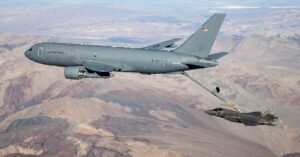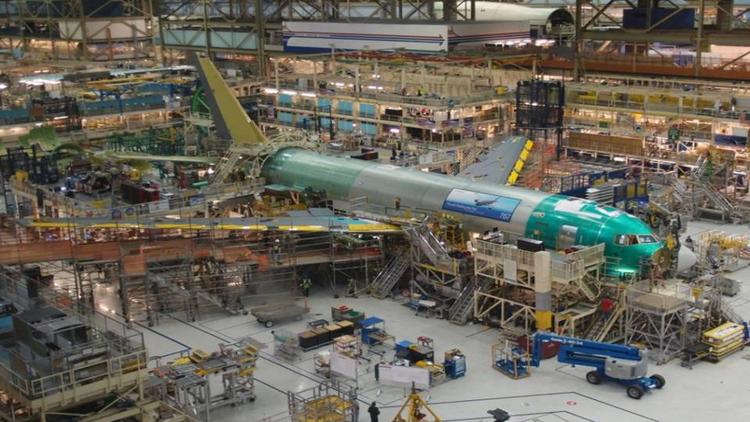WASHINGTON: The Air Force and Congress are simply sucking up the latest calamity to befall the KC-46 tanker, with representatives on both sides of Capitol Hill — and the prospective new Air Force Secretary Barbara Barrett — expressing support for the beleaguered program.
“There is no other option at this point,” explains Todd Harrison, the director of the Aerospace Security Project at the Center for Strategic and International Studies (CSIS). “The Air Force needs new tankers, and Boeing is the only one making them.”
This is despite the fact that the most recent deficiency discovered by the Air Force — a cargo lock that unlocked itself in mid-air — could endanger the safety of personnel or even cause the plane to crash, as first reported by colleague Valerie Insinna at Defense News. The incident caused the Air Force to indefinitely ban the plane from carrying any cargo or passengers.
“The rails and locks should be fairly straightforward to fix or replace,” Harrison explained, “but this is an incredibly important safety issue. If cargo comes loose during flight, it can shift the center of gravity of the plane and make it aerodynamically unstable.”
“That’s not good news for Boeing or the Air Force,” he said drily.

A KC-46 refuels an F-35
The tanker’s production is already behind schedule, following a spate of problems that caused an interruption in deliveries including foreign object debris (FOD) found littering the plane and issues with the Remote Vision System built by Rockwell Collins. Boeing’s first delivery came in January, some two years late.
Nonetheless, Barrett endorsed the need for the KC-46 at her confirmation hearing before the Senate Armed Services Committee (SASC) yesterday, in an answer to a question from Sen. Tammy Duckworth about support to the Pacific region.
“The Air Force has been building the KC-46 tankers to do midair refueling so we can extend our reach,” Barrett said. “We need greater reach by our fighters and bombers to be able to access that area.” She added that while there were a goodly number of the tankers in the pipeline, “at the moment we have a great dearth.”
In her written testimony, Barrett noted that the with the current deliver rate of three planes per month, the Air Force will reach its planned goal of 479 by November. However, it is unclear if she was aware of the most recent problem when that testimony was put together.
“The Air Force’s decision to block the KC-46 from carrying cargo and passengers proves the importance of operational tests and evaluations. It is critical that our warfighters are given the time and resources required to vet the operational efficiency of all military assets,” said Monica Matoush, House Armed Services Committee spokesperson, in an email today. “In this case, the aircraft crew executed their mission and found deficiencies. In doing so, the crew’s findings will make the refueling platform safer across the board.”
She added: “The Committee will continue to work with the Air Force to provide proper oversight to assure the safety and security of our service members, while ensuring our military services have the resources they need, when they need them.”
Similarly, Marta Hernandez, communications director for the Senate Armed Services Committee, said in an email yesterday that Chairman James Inhofe “understands the value of the KC-46 and getting it right.” She added that “the Committee will continue to exercise tough oversight over the program as we do with all programs of record.”
The Air Force in July announced it was withholding payments to Boeing due to all the problems and delays. About $360 million has been withheld so far, Defense One reported in July. The initial development contract, a firm-fixed price deal, was worth $4.9 billion. According to Defense News, Boeing has paid some $3.5 billion of its own to fix the various problems.
















108-225x125.jpg)


